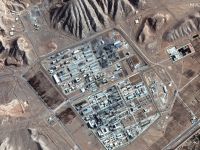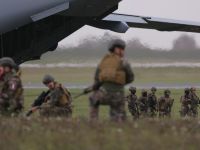When Josephine Mutungi heard gunshots at Nairobi's Westgate shopping mall on Sept. 21, 2013, she thought robbers had entered and sought cover in a store where some of her CDs and musical instruments were on sale.
"Can they just get on with taking the money quickly?" the 46-year-old Kenyan recalls thinking.
But the shots she and her children heard launched one of the biggest extremist attacks ever in Kenya — an assault by Somali extremist group al-Shabaab on Westgate, a shiny symbol of the East African country's growing prosperity, later transformed into one of bloodshed and terror.
The inauguration of a refurbished Westgate on July 18 will be overshadowed by memories of how four al-Shabaab militants held the complex for four days, shooting and throwing grenades indiscriminately. At least 67 people were killed.
Westgate will reopen six days before US President Barack Obama arrives in Kenya — an event that will put the spotlight on the continued extremist threat in the country of his ancestors.
Mutungi recalls that her son spotted two gunmen with scarves wrapped around their heads, cigarettes in one hand and rifles in the other. They fired at the shop windows but failed to shatter them.
"We were hiding under the shelves," she recalls. Mutungi later left the shopping centre splattered with blood and broken glass.
The repainted Westgate now boasts swanky shops and trendy cafeterias in what Nairobi Governor Evans Kidero described as Kenyans' "indomitable spirit."
"As a nation, we cried, we mourned, but ... Westgate is back," the governor said during a visit to the mall, passing workmen who were putting finishing touches on shops before the opening.
When Mutungi and her children ventured out of their hideout after the attack, they encountered only white and Asian rescuers.
"We never saw a uniformed Kenyan policeman in that mall," the mother says. Her testimony backs reports that most of the initial rescue work was done by volunteers and armed foreign civilians, thought to have been private security contractors or former government agents living in Nairobi.
Kenyan leaders gave conflicting information and appeared disorganized during the attack, and soldiers were later accused of looting stores.
A promised presidential inquiry has not materialized. The government did not produce the bodies of the extremists who were allegedly killed, and several individuals remain unaccounted for.
"We are still waiting for answers," Mutungi says.
Kenya has tried to improve security since Westgate, replacing security chiefs, announcing the recruitment of 10,000 more police officers, arresting thousands of extremist suspects and even making plans to build a 700-kilometre wall on its northern border with Somalia.
But the security forces have been accused of scapegoating Somali communities in Kenya, extorting money from suspects and even of torturing Muslims on the coast.
"There is a lack of understanding of who the enemy is and how to find them," said a Nairobi-based expatriate security expert who did not want to be named. "They are taking on whole communities, collectively punishing rather than finding the perpetrator."
Nearly 540 people have been killed in extremist attacks since Westgate, according to the risk analysis company Verisk Maplecroft.
They include at least 148 people who were killed by al-Shabaab at a university campus in the eastern town of Garissa in April.
"It will happen again," said professor David Anderson, an expert on the Horn of Africa at Britain's Warwick University. "It's almost impossible to stop. Kenya faces a real problem that would challenge any security apparatus in any African country simply because of capacity and scale issues."
Al-Shabaab has targeted Kenya since 2011, when Nairobi sent troops to Somalia to help the government battle the extremists.
Today, the perceived insecurity in Kenya has dealt a big blow to the tourism sector, which shrank by 7.5 percent in the first quarter of this year, according to official figures.
Governor Kidero has downplayed security concerns and invited Kenyans to shop at Westgate, where an Israeli company has reportedly installed luggage scanners and explosives detectors.
"Kenya is safer than ever. If it wasn't, Obama would not not be coming," Kidero said.
Mutungi, who had initially sworn never to return to Westgate, is starting to warm to the idea. "I'm not sure I'm ready," she says, but admits she is preparing to sell goods again at the mall.
"Death is everywhere, the issue of terrorism is everywhere, it's just a matter of getting used to it," said Patrick, who will work at a Westgate supermarket.
"We will not be cowed," he vowed.
By Catrina Stewart and Sinikka Tarvainen
This story has been edited from the source material.








